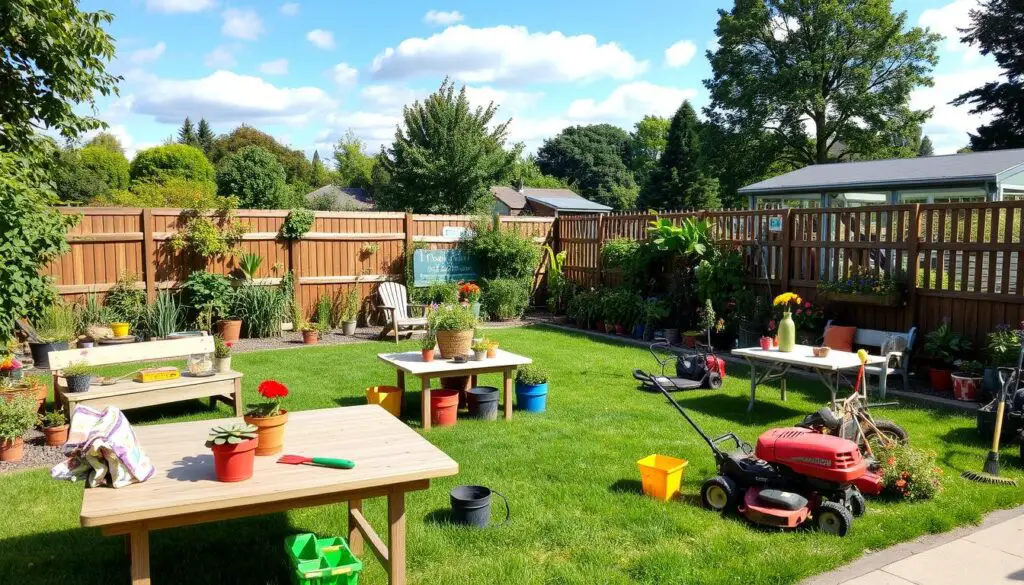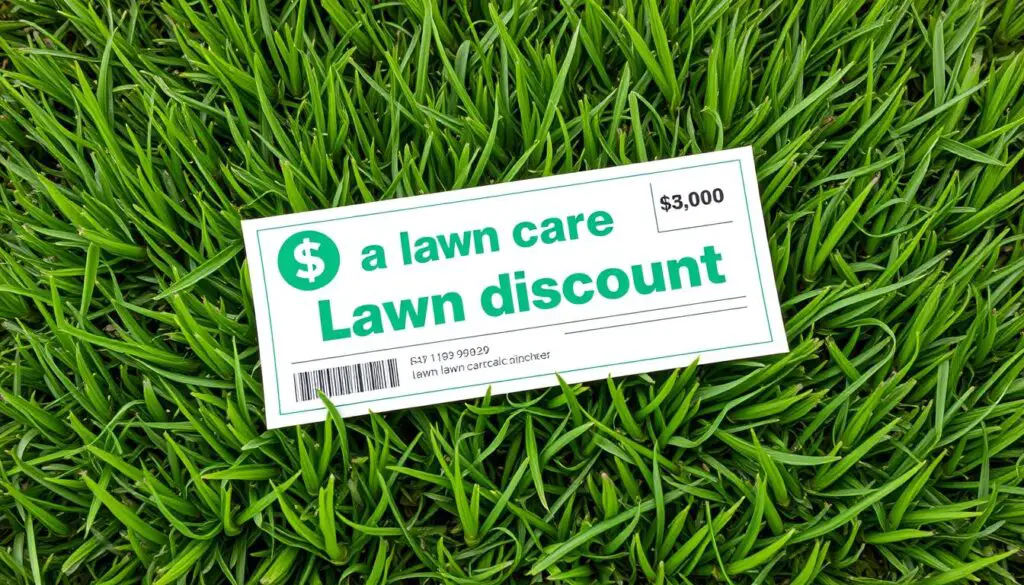How to Host a Lawn Care Workshop

Did you know 42% of new lawn care workers have no experience? This shows the need for good training in landscaping. Hosting a workshop is a great way to share your knowledge, meet your community, and help others improve their outdoor spaces.
In this guide, I’ll show you how to plan, promote, and run a successful lawn care workshop. You’ll learn about picking the right date and place, creating an interesting agenda, and using marketing well. You’ll become known as a lawn care expert.
Key Takeaways
- Lawn care workshops are a good way to share your knowledge and meet your community.
- Good planning and promotion are key to a successful event that draws your audience.
- Hands-on activities and demos teach valuable lawn care skills.
- Following up after the workshop and forming partnerships can grow your business and loyal customers.
- Having the right supplies, equipment, and insurance makes your workshop and business run smoothly.
Introduction to Lawn Care Workshops
Lawn care workshops are great for you and your community. They help teach homeowners how to keep their lawns healthy and green. This also helps you build a good name as a lawn care expert.
These events are a chance to meet new customers, get leads, and build a loyal fan base. You can also make money by charging for tickets or selling lawn care products.
Benefits of Hosting a Lawn Care Workshop
Hosting a lawn care workshop has many benefits. Here are some:
- Community Engagement: You get to connect with your community, building trust and goodwill.
- Customer Education: Homeowners learn how to care for their lawns, making them look better.
- Brand Building: You become known as a lawn care expert, boosting your brand.
- Revenue Opportunities: You can earn money from tickets, product sales, and new customers.
Identifying Your Target Audience
Before planning your workshop, know who you’re targeting. Are you focusing on homes, businesses, or both? Think about what your community likes, like gardening or DIY projects.
Knowing your audience helps you make your workshop better. You can tailor it to fit their needs and interests.
| Lawn Care Workshop Target Audience | Characteristics and Interests |
|---|---|
| Residential Homeowners |
|
| Commercial Property Owners |
|
| Gardening Enthusiasts |
|
| DIY Homeowners |
|
“By hosting a lawn care workshop, you have the opportunity to not only educate and empower your local community but also build a loyal customer base for your business.”
Planning Your Lawn Care Workshop
Choosing the Right Date and Location
Picking the perfect date and spot for your lawn care workshop is key. Think about the best time of year for lawn care in your area. Try to avoid dates when big local events or holidays might draw people away.
Go for a spot that’s easy to get to, like a community center or library. Make sure it has the right tools, room, and extras for your workshop. This will help everyone have a good time and learn a lot.
Developing a Comprehensive Agenda
Creating a detailed plan is vital for a great lawn care workshop. First, decide what topics to cover, like how to mow the lawn, prepare the soil, and control weeds. Mix in talks, hands-on demos, and Q&A sessions to keep things lively and educational.
Plan each part carefully, leaving time for questions and breaks. Aim for a length that keeps everyone interested but not too long.
| Agenda Item | Duration |
|---|---|
| Introduction to Lawn Care Basics | 30 minutes |
| Lawn Mowing Techniques | 45 minutes |
| Hands-On Soil Testing Demonstration | 30 minutes |
| Weed Identification and Control | 45 minutes |
| Seasonal Lawn Maintenance | 45 minutes |
| Q&A and Closing Remarks | 30 minutes |
“By planning the right date, location, and agenda for your lawn care workshop, you can create an engaging and informative event that helps your target audience improve their lawn care knowledge and skills.”
lawn care workshop tips
To make your lawn care workshop a hit, follow these best practices. They will keep your audience engaged and show off your skills.
Interactive activities are key. Try planting demos or weed challenges. These hands-on parts grab your audience’s attention and teach them how to care for their lawns.
Visual aids are also crucial. Use PowerPoint, videos, or lawn care tools to make your workshop pop. These tools help explain tough ideas and prove you know your stuff.
Share tips that people can use right away. Showing you know lawn care well will build trust and make your workshop worth it.
Make sure to answer questions and start discussions. A workshop where everyone can share ideas is more memorable and impactful.
Give out materials like handouts or lists after the workshop. This lets people keep learning about lawn care even after it’s over. By following these tips, your workshop will be both fun and educational.
| Safety Gear | Recommendations |
|---|---|
| Eye Protection | Impact-resistant safety glasses marked “ANSI Z87+” for proper eye protection. Faceshields marked “ANSI Z87” or “ANSI Z87+” offer face protection from debris. |
| Foot Protection | Steel-toe boots are recommended for foot protection while operating lawn care equipment. |
| Hand Protection | Work gloves provide hand protection from debris and sharp objects. |
| Respiratory Protection | A dust mask or bandana can minimize dust inhalation during lawn care tasks. |
| Hearing Protection | Earplugs or safety earmuffs should be worn with loud equipment to prevent hearing damage. Equipment noise levels can range from 90 dBA to 99 dBA. |
Keeping your lawn care equipment in good shape is also important. Regularly change air filters, replace spark plugs, and check oil and gas levels. This will make your tools last longer and work better.

“The lawn care workshop provided invaluable insights and hands-on experience that have transformed my lawn into a lush, healthy oasis. I highly recommend this workshop to anyone looking to master the art of lawn care.”
Promoting Your Lawn Care Workshop
To get people to come, you need to promote your lawn care workshop well. Make eye-catching flyers and posters with all the details. Put them in places like local shops, community centers, and gardening stores.
Don’t forget about digital marketing. Use social media and email to reach more people. Post interesting stuff on Facebook, Instagram, and LinkedIn. Make sure to include how to sign up.
Work with local groups like gardening clubs or home and garden stores. They can help spread the word. Also, look into ads in local papers or event listings to get more people to know about your workshop.
Creating Effective Marketing Materials
Make your flyers and posters stand out. They should clearly show when, where, and what the workshop is about. Use bright pictures and catchy words to grab people’s attention.
Leveraging Social Media and Local Outreach
Use your social media marketing to tell everyone about your workshop. Post things that show what’s in store and how to sign up. Ask your followers to share it with their friends.
Team up with local groups to promote your workshop. They can help you reach more people. Also, put ads in local papers or event listings to get more eyes on your workshop.
Preparing for the Lawn Care Workshop
Organizing a lawn care workshop needs careful planning for a smooth event. Make sure you have all the right supplies and equipment. This will help you give a hands-on and informative experience to your guests.
Gathering Essential Supplies and Equipment
First, create a detailed list of what you need. Include lawn care tools like mowers, trimmers, and aerators. Also, add educational materials like plant samples, soil testing kits, and multimedia for presentations.
Choose the right materials for demonstrations. Use different grass types, soil samples, and weeds to show lawn care techniques. Remember to have clear signs to help your guests move around easily.
Test all your equipment before the workshop. Having backups for any technical problems will help. This way, you can focus on making the event fun and educational for everyone.
| Essential Supplies for Lawn Care Workshop | Quantity |
|---|---|
| Lawn Mower | 1 |
| Lawn Trimmer | 1 |
| Aerator | 1 |
| Grass Samples | 5 varieties |
| Soil Testing Kits | 10 |
| Projector and Screen | 1 each |
| Signage | 10 placards |

By preparing well, you’ll host a lawn care workshop that will engage and teach your guests. They’ll leave ready to apply what they learned for a stunning lawn.
Conducting the Lawn Care Workshop
When it’s time to host your lawn care workshop, the key is to engage your audience and create an interactive learning experience. Start with an enthusiastic introduction that sets the tone and highlights the valuable information attendees will take away. Incorporate hands-on activities, visual aids, and opportunities for questions and discussion to keep your audience actively participating. Demonstrate your expertise and passion for lawn care, and be prepared to address attendees’ specific concerns and needs throughout the workshop.
Engaging Your Audience
One of the most effective ways to engage your audience is through interactive activities and Q&A sessions. Encourage attendees to ask questions and share their own lawn care experiences. This not only keeps them engaged, but also allows you to tailor the workshop to their specific needs and concerns. Incorporate multimedia elements like videos, quizzes, and group discussions to break up the lecture-style format and maintain their interest.
Practical Demonstrations and Hands-On Activities
To truly reinforce the lessons of your lawn care workshop, dedicate ample time to practical demonstrations and hands-on activities. This could include showing proper mowing techniques, demonstrating how to identify and treat common lawn problems, or allowing attendees to get hands-on experience with gardening tools and equipment. By providing these interactive experiences, you’ll ensure that your audience leaves the workshop feeling confident in their ability to apply what they’ve learned.
| Effective Training Methods | Ineffective Training Methods |
|---|---|
|
|
By focusing on engaging your audience and providing hands-on learning opportunities, you’ll create a lawn care workshop that is both informative and memorable. Attendees will leave feeling empowered to tackle their lawn care challenges and eager to put their new skills into practice.
Post-Workshop Follow-Up
After a successful lawn care workshop, it’s key to get feedback from those who attended. Sending out a short survey or questionnaire is a good way to learn about the workshop’s content, format, and organization. This feedback will show you what to improve for future workshops.
Gathering Feedback and Evaluating Success
By looking at what attendees say, you can keep getting better at helping your community. Check things like how many people came, how many signed up, and any new customers or leads. This review is crucial for planning better events and making your lawn care services more satisfying for customers.
| Key Metric | Benchmark | Actual Results |
|---|---|---|
| Attendance | 30 attendees | 35 attendees |
| Workshop Registrations | 20 registrations | 25 registrations |
| Sales Leads Generated | 10 leads | 12 leads |
By listening to and analyzing feedback, you’re ready to plan better lawn care workshops for your audience. This focus on getting better and making customers happy will help you grow your loyal customer base and expand your services.
“Implementing a structured process for gathering and acting on post-workshop feedback is essential for the long-term success of your lawn care educational initiatives.”

Expanding Your Lawn Care Services
Hosting a successful lawn care workshop can open the door to expanding your lawn care business offerings. Think about adding complementary services like lawn maintenance, landscaping, or pest control. This way, you can offer a full range of lawn care solutions. By expanding your services, you can keep more customers, earn more money, and be seen as the go-to place for lawn care.
Forbes says showing your brand the same everywhere can increase revenue by up to 23%. The workshop can help you find new ways to grow and diversify in lawn care. You might offer services like snow removal, landscape design, or eco-friendly lawn care.
When expanding a lawn care business, timing is key to avoid overworking or missing chances. Check your money, equipment, and team before growing. Also, make sure the new services will bring a good return on investment (ROI) to succeed.
| Opportunity | Potential Benefits |
|---|---|
| Lawn Maintenance | Increased customer retention, steady revenue stream |
| Landscaping | Diversified service offerings, appeal to new market segments |
| Pest Control | Comprehensive lawn care solutions, competitive advantage |
| Snow Removal | Year-round revenue, expanded customer base |
By wisely expanding your lawn care services, you can drive business growth. You’ll also boost your reputation and credibility in the industry. And, you’ll give your customers a more comprehensive and valuable lawn care experience.
Building a Loyal Customer Base
In the lawn care industry, keeping customers is key to success. It’s cheaper to keep an existing customer than to get a new one. By using smart strategies, you can grow a loyal client base and increase your profits.
Offering Discounts and Referral Programs
Discounts and referral programs are great for loyalty. Offering deals or packages can make customers want to keep coming back. Rewarding them for referrals can also help grow your business through word of mouth.
Studies show loyalty programs can boost retention by up to 20%. Also, 48% of people buy from companies with loyalty programs. And, 73% of customers look at price when deciding to buy.
| Retention Strategy | Impact on Customer Loyalty |
|---|---|
| Loyalty Programs | Up to 20% increase in retention rates |
| Referral Programs | 55% of consumers would recommend a company with good loyalty incentives |
| Competitive Pricing | 73% of customers influenced by price when making purchasing decisions |
By focusing on loyalty through discounts and other strategies, you can keep your lawn care business thriving.

“Acquiring a new customer can be five times more expensive than keeping an existing one.”
Partnering with Local Businesses
As a lawn care pro, I’ve learned the value of teaming up with local businesses. This helps me reach more people and find new customers. By working with landscapers, garden centers, or home improvement stores, I can promote my services better. This leads to more referrals and more ways to market.
Working together is crucial in lawn care. By teaming up, we can share resources and offer more to our customers. This helps both our businesses and builds a stronger community bond.
These partnerships have brought me new leads and made my brand more visible. By teaming up with businesses that serve the same people, I can use their customer base. This opens up new marketing chances that I couldn’t get alone.
FAQ
What are the benefits of hosting a lawn care workshop?
How can I identify my target audience for a lawn care workshop?
What factors should I consider when choosing the date and location for my lawn care workshop?
How can I create an engaging and informative lawn care workshop agenda?
What best practices should I follow to ensure a successful lawn care workshop?
How can I effectively promote my lawn care workshop?
What supplies and equipment should I have on hand for the lawn care workshop?
How can I engage my audience during the lawn care workshop?
How can I evaluate the success of my lawn care workshop?
How can I expand my lawn care business offerings after hosting a successful workshop?
What customer retention strategies can I implement after the lawn care workshop?
How can I build partnerships with other local businesses after the lawn care workshop?
Source Links
- https://www.lawnsite.com/threads/how-do-you-train-your-employees-for-lawn-service.228767/
- https://www.insurancecanopy.com/blog/how-to-start-a-lawn-care-business
- https://golfcourselawn.store/pages/beginners-guide-to-lawn-care?srsltid=AfmBOoqr4ijSbVkT2JshuYKK_fn6AQAGb3H1KnsOvGU-3S26cfmntKsX
- https://yardmastery.com/products/yard-care-bootcamp
- https://www.fieldroutes.com/blog/how-to-start-a-lawn-care-business
- https://www.thisoldhouse.com/lawns/21014956/simple-lawn-care-routine
- https://thelawncarenut.com/products/yard-care-bootcamp?srsltid=AfmBOop3la4onbURncUYtK8p4x85cNldMkeJkw3f2XjvDVdwC6cw7omG
- https://extension.okstate.edu/fact-sheets/lawn-care-safety-and-basic-maintenance-tips-for-teens.html
- https://golmn.com/blog/lawn-care-marketing-ideas/
- https://www.serviceautopilot.com/lawn-care/best-9-ways-to-market-your-landscaping-or-lawn-care-business/
- https://www.lowes.com/n/how-to/start-and-maintain-a-lawn
- https://www.familyhandyman.com/list/ways-to-prep-your-lawn-and-garden-for-fall/
- https://www.greenindustrypros.com/business-management/training-education/article/22912947/lawn-squad-franchising-the-importance-of-training-and-support-systems-in-the-lawn-care-industry
- https://www.linkedin.com/pulse/revolutionize-your-employee-training-engaging-lawn-care-fred-haskett-x86qc?trk=public_post_main-feed-card_feed-article-content
- https://www.greenindustrypros.com/mowing-maintenance/article/11419713/effective-training-for-lawn-care-companies
- https://www.linkedin.com/advice/1/what-best-ways-provide-follow-up-support-after-training-8nyhf
- https://jackiecolburn.medium.com/the-dos-and-donts-of-a-successful-workshop-84213f87c23c
- https://kaizan.ai/12-tips-for-facilitating-a-client-workshop/
- https://www.fieldroutes.com/blog/how-to-grow-lawn-care-business
- https://tysoutdoorpower.com/grow-your-lawn-care-business-why-when-and-essential-questions-to-ask/
- https://lawnlove.com/blog/how-to-grow-your-lawn-care-business/
- https://www.hellocheck.co/articles/6-keys-to-successful-customer-retention-in-the-lawn-care-industry
- https://www.youraspire.com/blog/landscaping-customer-retention
- https://mightysites.com/articles/how-to-get-more-lawn-care-customers
- https://mightysites.com/articles/proven-strategies-for-promoting-your-lawn-care-business
- https://www.insurancecanopy.com/blog/lawn-care-marketing
- https://www.podium.com/article/top-10-marketing-tips-for-lawn-care/

